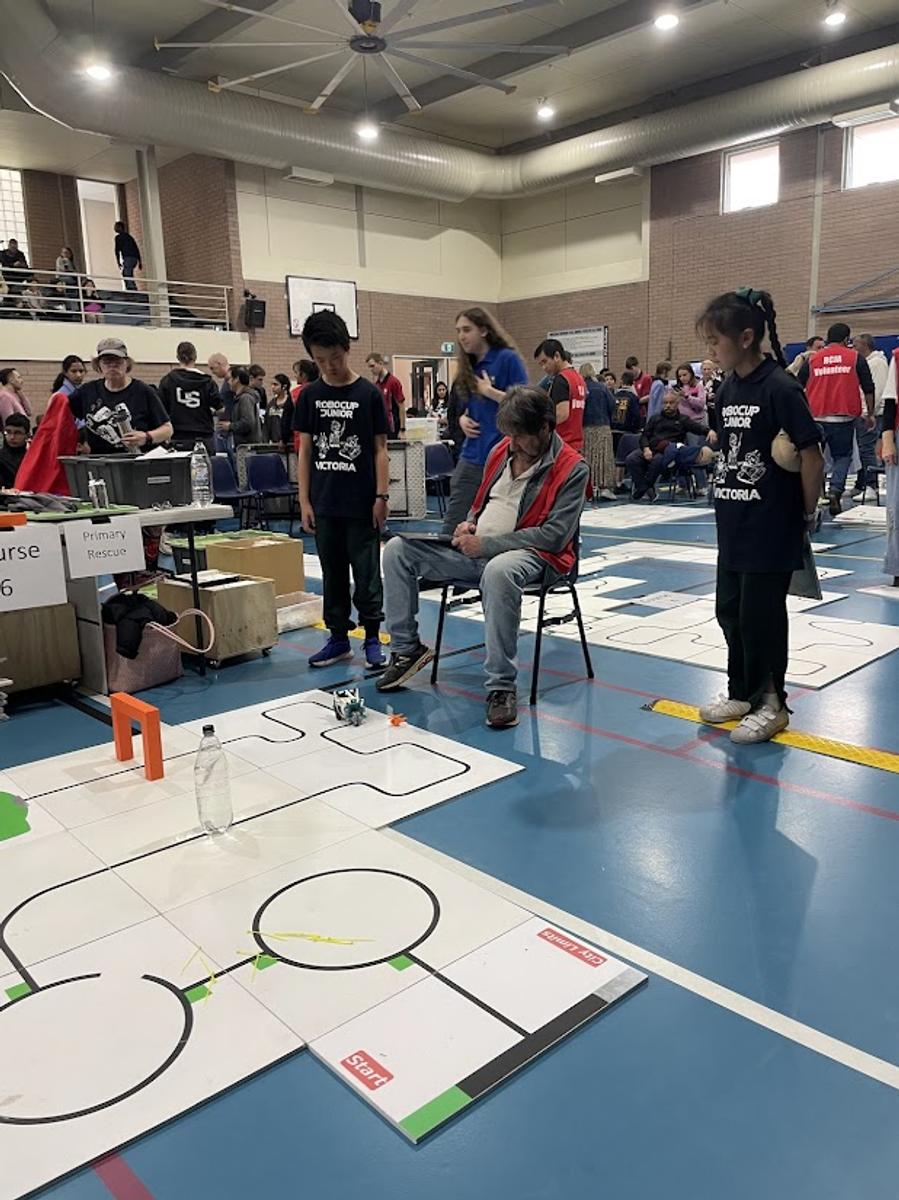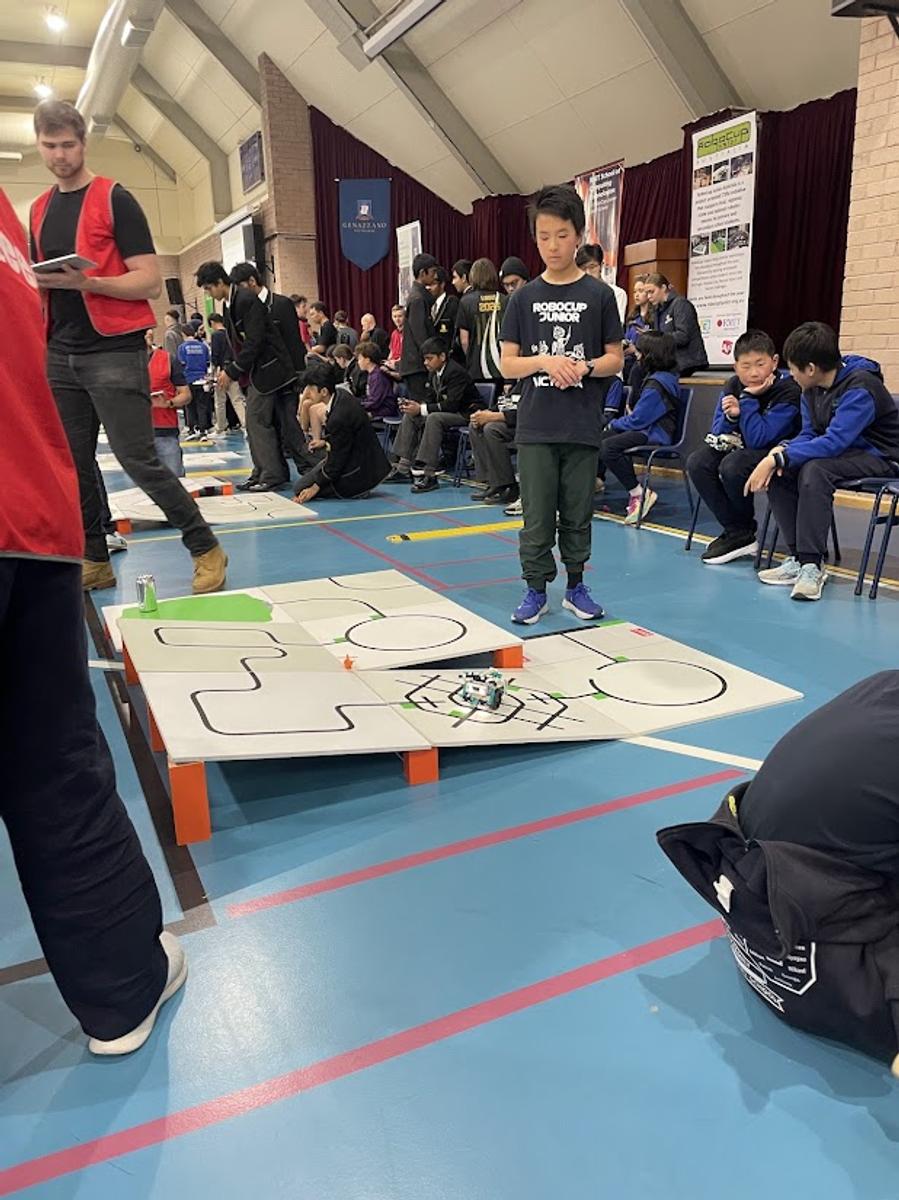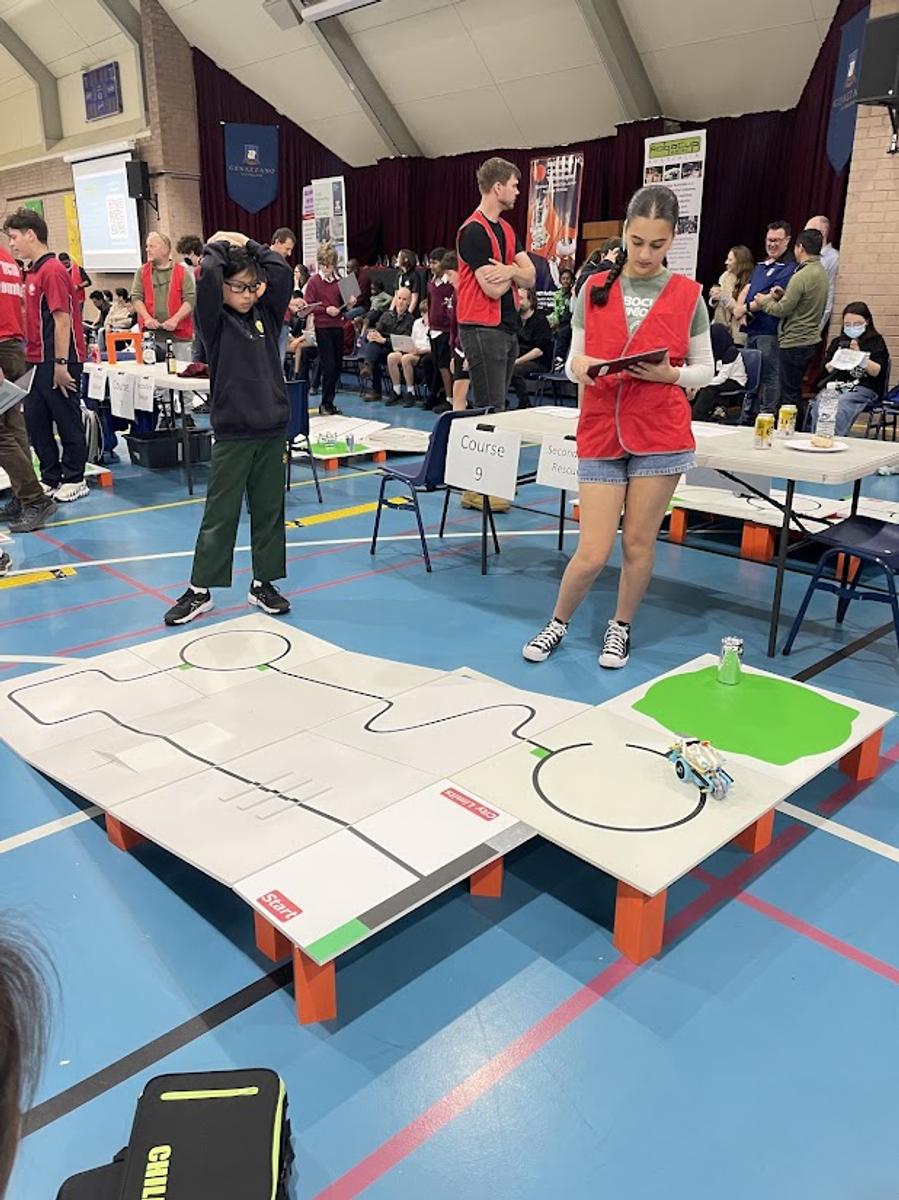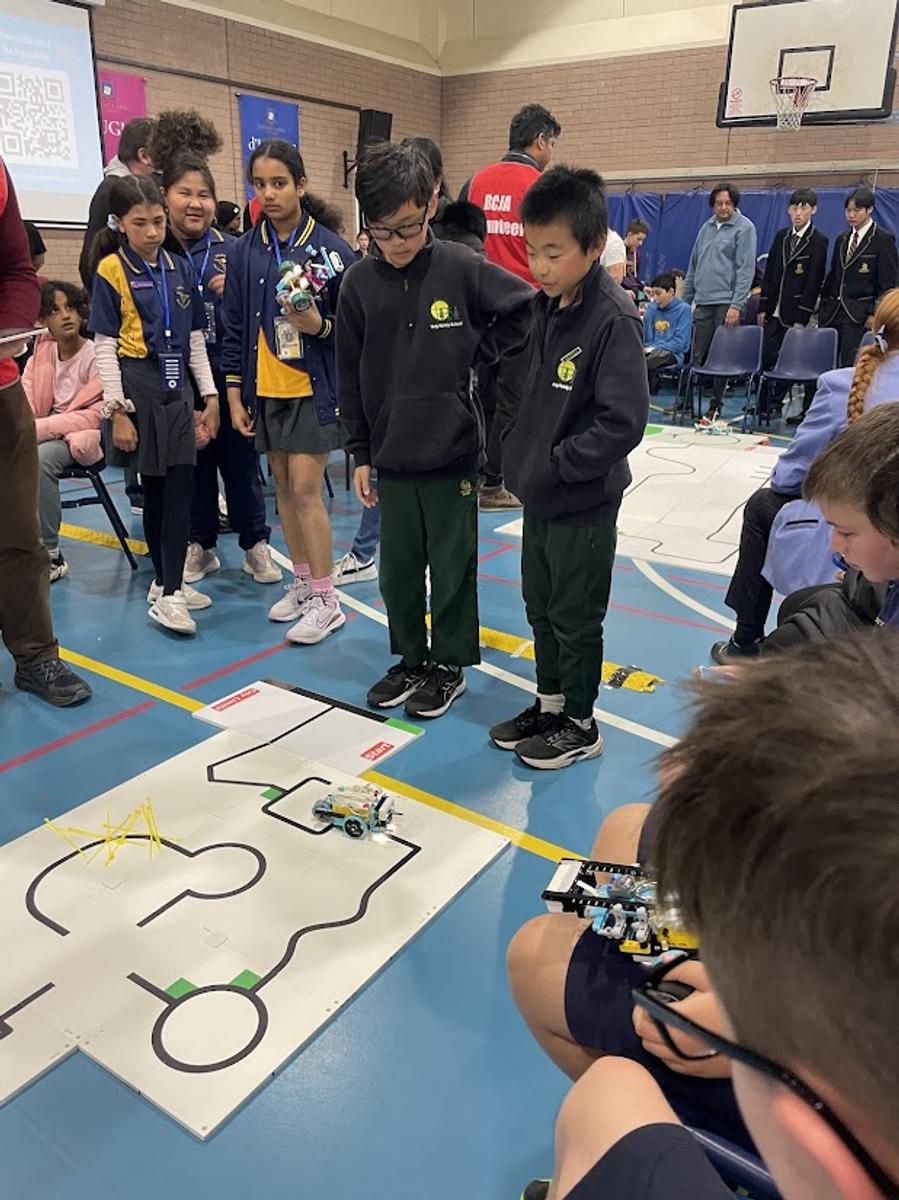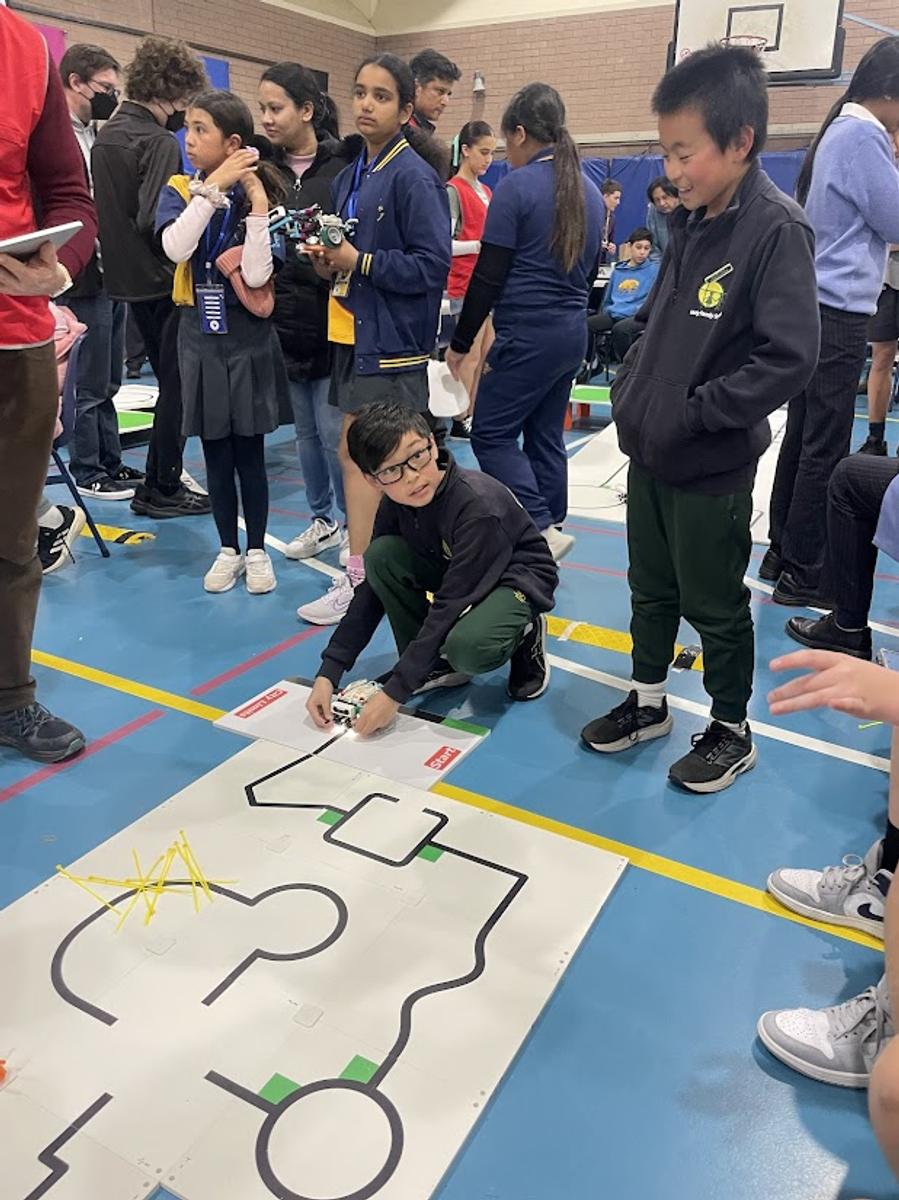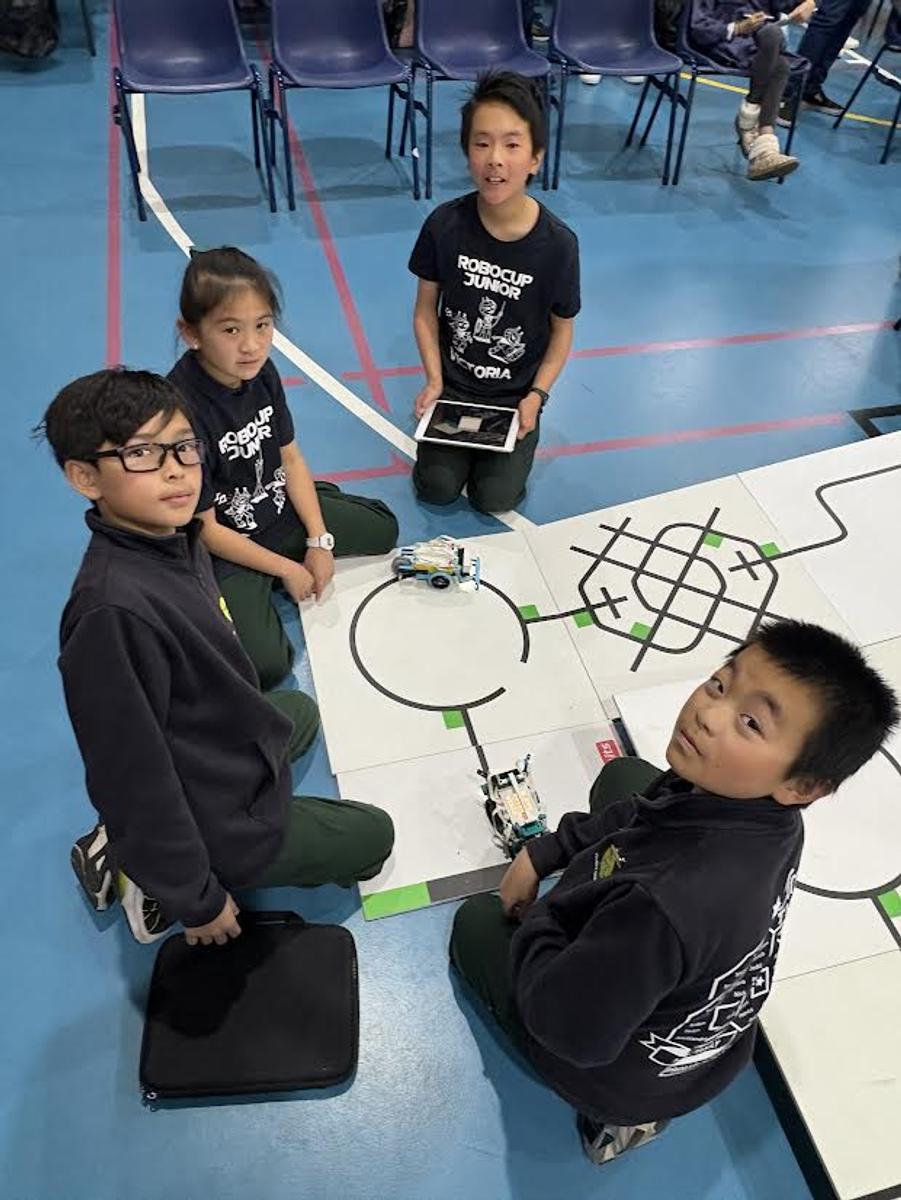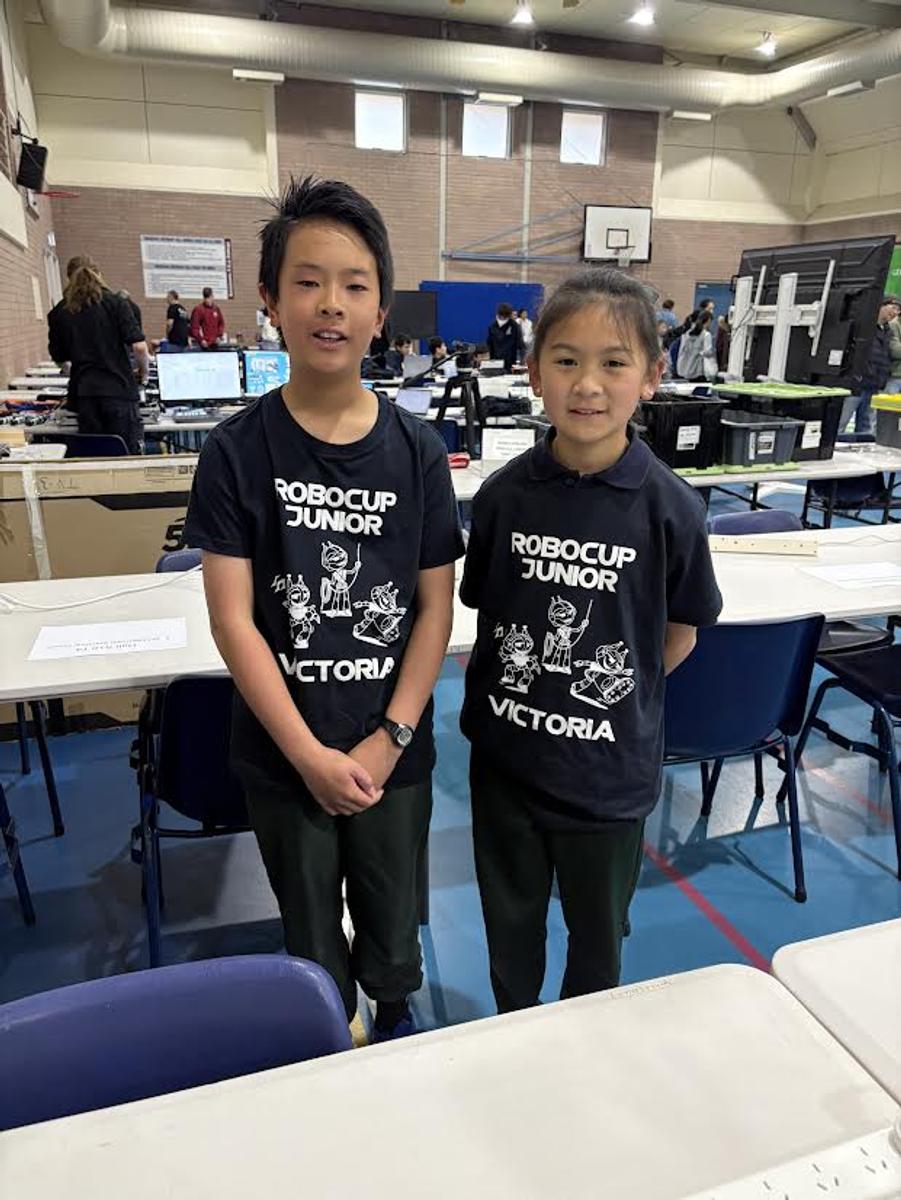Digital Technologies

Robo Cup
Victor: We went to a robo-cup competition at ‘Genazzano FCJ College.’ It was massive and the gymnasium was like the size of our whole school. It was definitely a great experience and I really enjoyed seeing other students being so passionate about their robot. I also felt very eager to see the robot go across the course. The courses were very hard and many teams failed, also there was some really cool stuff at the competition, for example there was a robot that could play soccer! That was really cool and seeing our robot follow the track was really exciting, but it was also nerve wracking. I was on a team with Neil and we created a robot and our team name was ‘Super Sparks,’ we named it that because we really thought about how we were sparking new ideas. We had a lot of problems with our robot at the beginning, but then Neil and I, through trial and error, found out how to fix it. After all of our bug fixing we still failed on some parts, even so I felt really proud about what the ‘Super Sparks’ had done. It was a great experience and I would definitely do it again if I had the chance. I know that if I didn’t have Neil as my teammate I would never get this far. We also did another competition before that one at ‘Ramlegh Park Primary School.’ That one was really fun and was basically just practice for the real one. At the competition we had a whole different system of code. It was a code that Neil created that was really slow and did tiny turns. It was very accurate, but since time cost points we had to make the robot faster, so I created this code that went really fast and made big turns. The code was basically the opposite of Neil’s. Overall both of the competitions were great and I would love to do it again.
Neil: I was really excited, it was super fun and I believe we did really well and it was definitely a good experience and was worth it 100%! The RMIT university was there and they had really cool robots that could play soccer, I mean.. kind of. The actual competition was hard though.
Making the robot be able to traverse the course successfully was always hard and like trying to put magnets on their same side of polarity against each other. Every time I fixed something, something else wouldn’t work and if I tried to change the robot’s physical design, part of the code wouldn’t work! It was a disaster. But I ended up finally finding the solution after many trials and errors. But by the time I found the solution, it was far too late because I had already failed the first and highest point scoring courses.
I am still really proud of myself though I had lost the main points, but what really matters is we all had fun and we tried our best to compete. It was fun and games and the experience was really fun.
The second course was definitely the hardest because nobody scored full points on it, but some people got really close to full points! It was a tough competition, maybe my hardest yet, but as long as you keep trying, you’ll never fail to achieve your goals.
I never gave up on my robot and I kept adding adjustments and fixing all bugs with the robot. I could never have done it without the help of my good friend Victor.
I also got ‘inspiration’ from my friends from Mikael’s team. He gave me the way to gridlock and how to return to the line, successfully.
We also had another competition at ramleigh park. It was an easier competition, but me and Victor weren’t as developed in the bot or the bot’s code yet so that made the first competition less successful. Me and Victor could definitely have done better if we had our current code in the first competition, we could have definitely done better if I had my current code, but the past is in the past and I cant change it unless I have a time machine, and I certainly do not have a time machine.
The first competition was as fun as the second competition, but all the losses made will never be recovered so all I have to do is learn from the past mistakes and improve on them and consolidate. The competitions were also fun because I could skip a bit of school time which was pretty fun! Robo-Cup is one of my most favorite competitions I have ever been to and competed in. It was truly the highest honor and privilege and prestige to have even entered the competition to represent my school. I am really proud of my achievement and what I have achieved in the last 6 months. Me and Victor came 5th place at Ramleigh Park and we came 7th place at Genazano College which was an improvement considering the higher number of people who participated in Genazano College, we barely got seats at Genezano College. I worked as hard as I could and it was definitely worth it all! I can't wait until I enter another competition like these ones.
My highlight was building the robot and coding it with Victor. It was so fun to be able to mess around with the robot and have fun codes that entertain us. I made games on the robot’s hub and me and victor played those games for long periods of time at a time. They were real moments to remember, I’ll never forget all the good times when I got to work with the robot. I hope the next people who represent Holy Family in robotics will do better than us and get better scores and hopefully, win a few medals.
I always knew that first was a long stride, but as long as you give it a go. You’ll always win. It’s not the person in first place who wins, it’s the person who works with passion is the true winner.
Mikael: I was really excited for the competition. My teammate and I worked really hard to create a robot that could navigate the obstacles of a robocup course. We used sensors, wheels and other electronics to construct a robot that would follow a black line with indicators and push a can out. During playtimes and lessons we spent hours in the STEM room testing and testing our robot so we got the best results.
During our Ramlegh Park competition my team (the Circuit Surfers) we finished 2 courses with full points and in all the other courses we got at least 80% of the course’s points. We finished 4th out of 12 schools and Kaitlyn and I felt really proud.
At our Genazano competition the courses were a LOT harder, and we managed to get at least 40% points on all courses. It was our final one for primary school and I felt satisfied with my second season of Robocup.
Kaitlyn: I was quite nervous. My family was there to watch and cheer us on. It was really cool over there. They had robots that could kick a soccer ball by itself! My team was called ‘Circuit Surfers’ with Mikael and I in it. It was pretty fun testing and coding our robot. Our robot had to follow a line, go around obstacles and knock a can down. It was stressful with all the people around us and especially when our robot didn’t work on the course we were competing on. There was always something that went wrong. The courses were so much harder than the ones in the other competition. In the end it was a really fun, nice experience and I really enjoyed it. We were very proud at the end of the competition and I was definitely very tired. I’m happy it was done though. I don’t know what place my team came by but we did our best. 😊
eSmart
1. What are gateway behaviours?
Gateway behaviours are smaller-scale antisocial acts that can be overlooked in everyday interactions with children, but these behaviours have the potential to progress to more serious issues both at home and in other contexts (such as your child’s school or peer group). For example, behaviours such as eye-rolling, ignoring, name-calling or mocking, embarrassing others, whispering or exclusion are often precursors to more serious physical or psychological bullying or harassment of peers or defiant or oppositional behaviour towards adults. Sometimes these behaviours can also be observed via body language, by the way children speak about their peers (e.g. who is ‘in’ or ‘out’ of a social group), children’s attitudes towards teachers or other adults, or they can be observed by reactions.
2. Why are gateway behaviours important to address?
When parents fail to notice or they ignore smaller-scale antisocial acts, they inadvertently help to normalise them. Over time, this can have a big impact on relationships within the home (e.g. between siblings or in children’s interactions with parents). It also impacts other people and spaces where children interact regularly, including the child’s peers, teachers and classroom.
Research has found that children who demonstrate problematic behaviour displayed lower social competence [1], poorer school performance and more negative teacher and peer relationships over time [2]. This means that these seemingly minor antisocial acts have potential longer-term effects on children’s development, experiences, and quality of their social relationships. Addressing gateway behaviours is important for a child’s social and emotional learning to help them to learn appropriate and effective communication strategies and behaviours.
3. What can parents do?
Parents play a significant role in building empathy among children by using teachable moments to call out antisocial behaviour in any form. This can happen by:
- Paying attention: Notice gateway behaviours and make a conscious decision to address them.
- Considering your child’s friendship circle: Start to identify who forms part of your child’s friendship group and the interactions and activities they might be engaging in, discussing, or promoting.
- Calling out the negative: Address the smaller issues in the moment rather than further down the track or when things escalate. When doing so, respond from your own perspective of the issue (e.g. “I don’t like what you did there”, “I thought that was rude”) and hold them accountable.
- Emphasising the positive: Recognise and reinforce good behaviour (it’s not just about addressing the bad!).
References
[1] Hukkelberg, S., Keles, S., Ogden, T., & Hammerstrøm, K. (2019). The relation between behavioral problems and social competence: A correlational Metaanalysis. BMC psychiatry, 19(1), 1-14.
[2] Alzahrani, M., Alharbi, M., & Alodwani, A. (2019). The Effect of Social-Emotional
Competence on Children Academic Achievement and Behavioral Development.
International Education Studies, 12(12), 141-149.
https://esmart.amf.org.au/resources/ accessed on 15/09/2025
Screen time for your child- 7 tips

